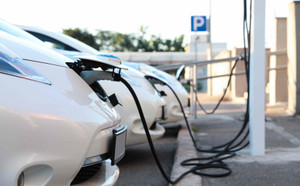Costs of Installing an Electric Car (EV) Charging Station in Canada
By Kijiji Autos
New Africa - stock.adobe.com
The cost of installing an EV charger at home in Canada depends on a variety of factors such as charger price, electrician labour rates, provincial charger rebates and more. Generally speaking, an uncomplicated installation that does not require upgrades to your home's electrical systems should cost an average of $1,500 for equipment and labour.
As electric vehicles continue to sell in ever-greater numbers across Canada, many drivers are having chargers installed in their garages to avoid having to plug in at a public charging station.
Adding an EV charger to your home's electrical system is like having your very own gas station, allowing you to choose when and for how long your EV stays plugged in. EV home charging also allows you to take advantage of much lower off-peak electricity rates overnight, saving you money on your hydro bill, reducing strain on the wider electrical grid and ensuring that your EV is ready with maximum range when you get into it each morning.
Read on for an outline of all the factors that can affect the price of buying and installing a home EV charger, including available provincial rebates that can save you hundreds of dollars on the purchase price of a charger.
EV charger levels differ in costs
EV chargers come in three different levels based on how much power they're able to supply to your car's battery and how quickly they can add driving range.
Level 1 charging
Level 1 charging cables often come as standard equipment with the purchase of an EV while aftermarket examples generally sell for between $300 and $600.
Level 1 chargers are a cost-effective option for people who drive short distances infrequently due to their slow charging speed. They can take up to 20 hours to charge a moderately-sized EV battery, meaning that commuters who travel 100+ km regularly would be better off with a faster charging option. Level 1 charging is a fine option for drivers who only use their vehicles for short journeys that don't require a full charge, and their ability to plug into any outlet means that their installation cost is essentially zero.
Level 1 chargers are the slowest way to add range to your EV, but have the advantage of being able to plug into any of the many 110-volt outlets located throughout your home. This can add convenience because many homes are designed with 110-volt outlets on exterior walls, meaning you don't need to have a garage to charge up your vehicle overnight.
Level 2 charging
Level 2 chargers can range in price from as little as $400 up to $4000 for models with all the bells and whistles like bi-directional charging which allows your car to send electricity back to your house during a power blackout.
Professional installation is another cost factor for installing a level 2 charger at home which we'll go into detail on below. Level 2 chargers are ideal for home applications because they can fully charge a vehicle's battery in as little as 4-6 hours, making sure you've got maximum range by the time you get in for the morning commute.
Level 2 charging is considerably faster than level 1 but does require more financial outlay in terms of buying a wall-mounted charging station and having it installed by a licensed electrician. Level 2 chargers operate on the same 240-volt circuit that your home's major appliances like laundry machines and electric stoves do, requiring a dedicated 240V outlet.
Chargers found in public places like businesses and charging stations are often of the level 2 variety because of their ability to add a good amount of range in the time that drivers may spend shopping or working; as much as 40-50 km per hour.
Level 3/DC fast charging
Not all EVs are capable of accepting level 3 charging speeds, but ones that can take advantage of the fastest charges currently available to the public with the ability to add up to 870 km of range per hour of charging. This kind of capability doesn't come cheap, as level 3 chargers can range in price from $40,000 to $175,000 per unit and require a 480-volt power supply plus the price of commercial installation and servicing. Tesla's Supercharger network is a level 3 system.
Level 3 charging is not really viable for home applications because of the price of entry and the required voltage, but is still worth mentioning because of the possibilities it opens up for EV drivers. Also known as DC fast charging, or supercharging for Tesla vehicles, level 3 chargers are found at an increasing number of dedicated charging stations (think gas stations but for EVs), outside shopping malls and along major highway arteries.
Costs to consider when installing EV chargers
There are a number of potential costs to take into account when planning the installation of a home EV charger. Depending on where you live in Canada and when your home was built there could be more to think about than simply purchasing a charger and having it installed. Here are all the things that you need to consider before installing a home EV charger along with estimates on how much they're likely to cost.
Electric vehicle chargers
As we mentioned above, different levels of electric vehicle chargers have different capabilities and come in at different price points. Simple level 1 chargers generally cost between $300 and $600, while level 2 chargers can cost anywhere from $400 up to as much as $4000. Tesla sells its Wall Connector level 2 charger for $575, and on the off chance you're looking to open your own commercial level 3 DC fast charging station unit costs range from $40,000 to $17,000.
Permits
Having a fully licensed electrician install your new EV charger is absolutely essential. Electricity can be extremely dangerous and your house's wiring should only be worked on by qualified technicians who know what they're doing. Before you have any electrical work done on your house, some provincial governing boards require you to file for a permit to prove that the work is being performed by qualified contractors.
Homeowners in British Columbia can expect to pay around $118 for such a permit while in Ontario it costs $81. Although these permits don't cost much compared to the rest of the purchase and installation fees they're still worth considering. Many electricians will apply for these permits as part of their service to you and build the price into their estimates.
Labour
Skilled labour is another cost to consider for home EV charger installation and can vary based on what your charging solution looks like. As a rule of thumb, the more complex the installation is the longer it will take and the more it will cost. In newer houses where the electrical panel is located in the garage, the electrician could be in and out within a matter of a few hours, while older houses with less accessible panels can require new wiring routed up from basements and through walls.
A licensed electrical contractor in Ontario usually charges between $90 and $180 an hour for their services, so costs can quickly pile up if new outlets and other equipment is required. An easy installation can cost around $600 with prices rising from there based on complexity.
Upgrading electrical panel
An additional cost that can raise the price of your new EV charger is the potential need to upgrade your home's electrical panel if you live in an older house. While modern houses are usually built with easily accessible 200 amp panels, older buildings often feature less powerful 100 amp units. These may still be fine for running appliances, heating and lighting but modern homes filled with larger TVs and refrigerators require more power and adding an EV charger to that load can stretch them beyond their capabilities. You may still be able to install a level 2 charger, but if your home's electrical panel can't supply it with enough power then you may as well be charging at level 1.
Upgrading your electrical system to 200 amps is a costly process but comes with a number of advantages. First, your EV(s) will be able to charge up overnight while all of your house's other electrical functions operate flawlessly. Second, newer electrical equipment is safer than old and you're likely to see a reduction in your home insurance premiums thanks to your upgrades. Finally, you're future-proofing your house and ensuring that it can keep up with your electrical needs for years to come. Replacing an old 100 amp panel with a new 200 amp one can cost $3200 or more if you have a larger house to supply power to.
Materials
Installing a home EV charger, especially in a location far from the electrical panel, can require spending more money on required materials. Required materials can include large gauge wiring to handle the charger's power demands and rated for outdoor applications, circuit breakers, outlets, junction boxes, clips and other consumable materials involved in the installation. The number and quantities of these materials required depend on how complex your home charger's installation is, and can range in price from a few hundred dollars into the low thousands. Not every installation will require all these extra materials, but it's important to go into the process with your eyes open to how costs can add up.
Price of electricity
Finally, and fairly obviously, there's the price of electricity from your hydro provider to consider when buying and installing a home EV charger. How much you pay for the electricity used to charge your vehicle depends on a few factors: its battery size, how much electricity costs where you live and when you choose to charge your car. Larger batteries can take on more electricity and give you a longer driving range, while the time of day (or night) that you plug in can have a major effect on your energy bills. Most energy providers use time-of-use billing to calculate your bill, meaning that you pay less for electricity during periods with lower demand on the grid like the middle of the night.
For example, Toronto Hydro's on-peak hours are weekdays from 11 am to 5 pm. During these hours power is billed at 15.1 cents per kWh. Conversely, off-peak hours are weekdays from 7 pm to 7 am as well as weekends and holidays where electricity costs just 7.4 cents per kWh, giving savings of more than 50%. At these prices, charging a Tesla Model 3 with a 60 kWh battery would cost $9.06 during the day or $4.44 overnight.
While it's perfectly natural to worry about your energy bill skyrocketing as a result of charging your electric car, it's important to consider that the Tesla's 60 kWh battery gives it a driving range of around 430 km. Any way you slice it, even paying the $9.06 peak-time rate is much less expensive than the gasoline required to make even the most fuel-efficient gas-powered vehicle travel 430 km. Yes, the up-front costs can be high, but the fuel savings are there to be had too.
Home EV charging station rebates
While a number of provinces and territories offer rebates towards the purchase price of a new or used electric vehicle, rebates for home EV chargers are fewer and farther between. If you happen to live in Alberta, New Brunswick, Nova Scotia, Nunavut, Ontario, PEI or Saskatchewan then you're out of luck and your province/territory won't be helping out with the cost of your new EV charger. However, if you're a resident of British Columbia, the Northwest Territories, Quebec or Yukon then your government is available to provide a helping hand.
Residents of EV-friendly British Columbia are eligible for a rebate of up to 50% of the purchase and installation price of eligible level 2 chargers up to $1400 thanks to a partnership between BC Hydro and the provincial government. Municipalities are also getting in on the act, with places like Nanaimo offering a further $150 on top of the $700 given by the provincial rebate. Quebec is also providing its residents with a rebate of $600 towards the purchase and installation of eligible level 2 home chargers and $500 is available to homeowners in the Northwest Territories. Yukon currently provides a 50% rebate for costs up to $750 for one level 2 charger per personal residence. Municipal rebates are available in BC's Saanich district up to $350, up to $250 in Granby, Quebec and in many other areas around the country.
While not providing rebates per se, the government of Manitoba is providing financing up to $3000 per charger and the City of Toronto's Home Energy Loan Program gives low-interest loans for the purchase and installation of EV chargers among other home energy system upgrades with up to $125,000 available per household.
Frequently asked questions
How much does it cost to install a level 2 charger at home in BC?
According to our extensive research, homeowners can expect to spend around $1000 on a charger, $150 for permits, $400 for labour and $200 for materials for a total of $1750. After BC Hydro and government rebates are applied buyers can expect to see that price come down to an average of around $1050. BC is one of Canada's most EV-friendly provinces and its rebate programs can help a great deal with the cost of buying and installing a level 2 home charger.
Which provinces have the best rebates for home EV chargers?
Yukon currently leads the pack on provinces/territories with the best rebates for home EV chargers thanks to its rebate of up to $750 for level 2 chargers followed by BC with its up-to-$700 partnership between BC Hydro and the provincial government, plus a sizeable list of municipalities that will add to that figure with rebates of their own.
Next comes Quebec with a $600 rebate offer pending proof of purchase as well as its own range of municipally offered incentives to get more homeowners charging their EVs at home.
The Northwest Territories are close behind with $500 available as a rebate for new home EV charging customers. Finally, there's Manitoba which, although not offering rebates, does offer low-interest financing of up to $3000 per home EV charger.
While many provinces and territories offer incentives and rebates towards the purchase price for new and used EVs, fewer contribute to getting their residents set up with a level 2 EV charger at home. Home charging is a convenient and inexpensive way to make sure your electric vehicle is charged up and ready for each day, and we believe that more and more provinces and territories will jump on board and offer rebates for the purchase and installation of home chargers in the years to come. If you're in the market for a new or used EV, check out the extensive listings available at Kijiji Autos for sale in markets across the country.
Easily find your next ride on Kijiji Autos
Search nowToronto to Calgary Road Trip: Routes & Tips
Planning on driving from Toronto to Calgary? Here are some routes and tips to help you along the way.7 items you can fit in an SUV: TVs, mattresses and more
Discover seven common items that fit in an SUV below.Flat Tire vs Blowout: What's the Difference & What Should You Do?
The main difference between a flat tire and a blowout is that a blowout often feels like an explosion has occurred underneath your vehicle. Blowouts can cause sudden and drastic changes to the handling of your vehicle and can lead to minor or even serious accidents.Tips to help protect your vehicle and budget for car repairs
When shopping for your next vehicle, it's always a good idea to keep hidden costs in mind. Before you buy, let's look at how much it can cost to maintain a car in Canada, how much you could budget for annual maintenance and repairs, and how to help protect your car against damage and depreciationWhat is the value of undercoat protection on your vehicle?
When you buy a new vehicle, protecting it so that it lasts as long as possible is definitely top of mind, whether that's through security upgrades or an extra coat of paint. But how often do you consider the care and safety of your vehicle’s undercarriage?The top three best paint protection options for your vehicle
Buying a new vehicle is a great experience. Nothing beats hitting the road in a car you bought fresh off the lot. However, as fun as it is to finally get behind the wheel of your new ride, it's important to take your time through the process.Financial guide: post-pandemic car shopping and gas price hacks
With populations locked down and international borders closed the global supply chain has been disrupted on a massive scale, pushing up inflation around the world and raising the cost of everything that people need to get back to normal. Here are a few tips you can use to grab the vehicle you want without breaking the bank.10 tips to help make the road a better and happier place
We have all, at some point, been responsible for making the roadways stressful in one way or another. Alternatively, we are all equally capable of making the road a happier place. Let’s explore 10 unique ways we can help make the driving experience better again, for everyone's sake.10 eco-driving tips that can help you save money and reduce your carbon footprint
With rising gas prices, carbon taxes on fuel and concerns about climate change, many Canadians are wondering how to save gas when driving. Experts recommend adopting eco-driving techniques that can help you save money and fuel. Read on to discover 10 of them:10 great road trips in Canada
Living in one of the biggest countries in the world, it's pretty common to hear the open road calling. From the Rocky Mountains to the Gentle Island, the Great Lakes to the Badlands, grab your favourite gas station snacks, press play on your driving playlist and hit the road.








